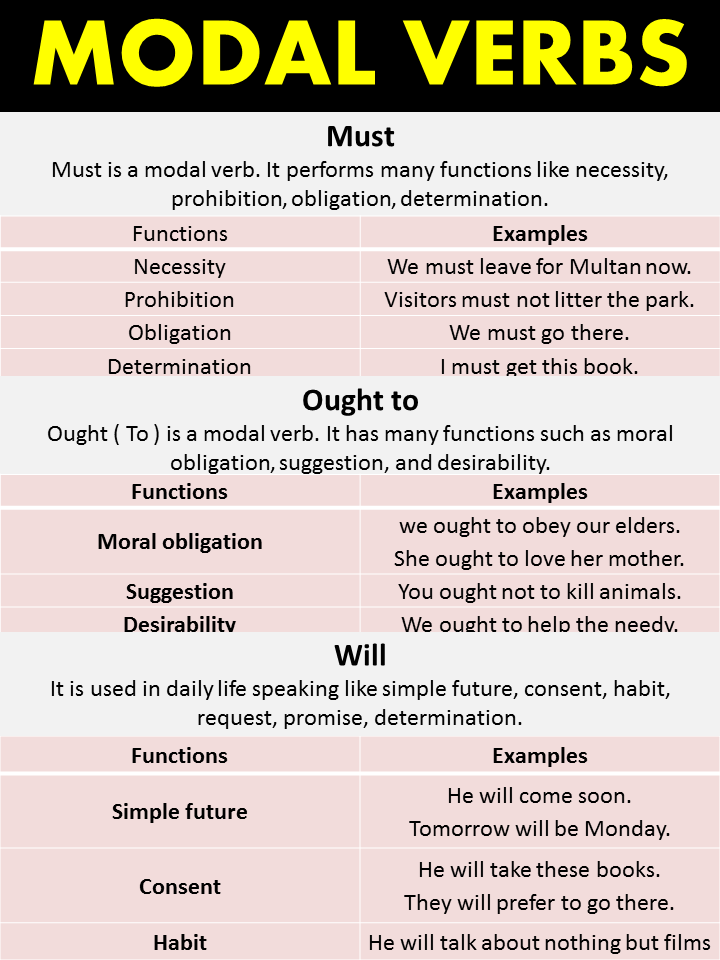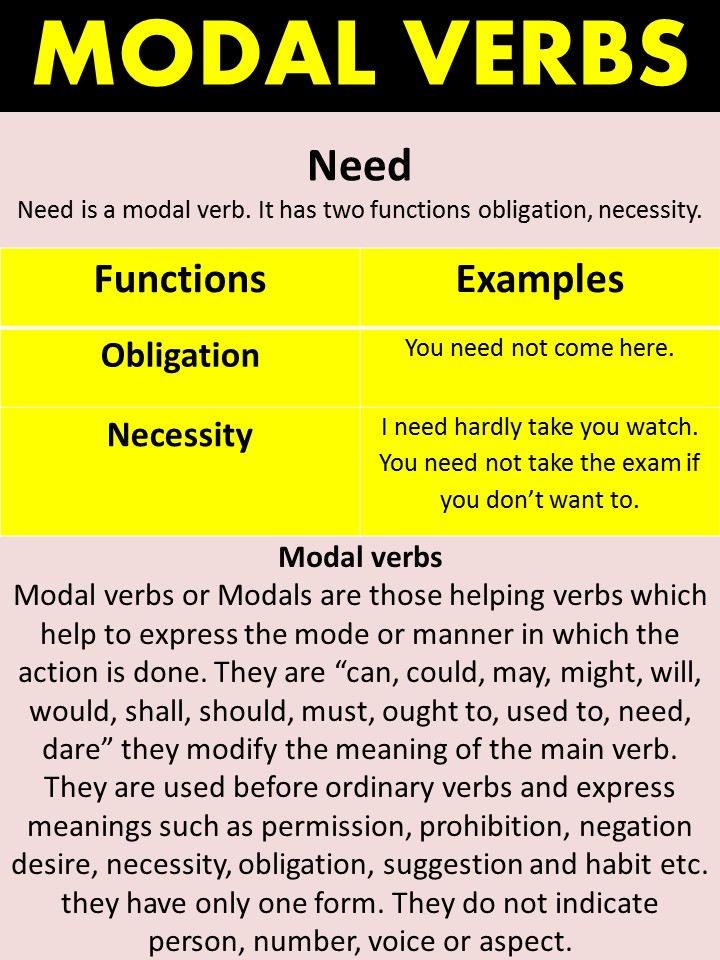Have you ever noticed how English speakers use certain words to express possibility, obligation, or permission? These unique words, known as modal verbs, play a crucial role in shaping the meaning and tone of our language. From can to must to should, modal verbs offer a fascinating insight into the nuances of communication in English. Understanding their usage can unlock a world of expression and subtlety that goes beyond simple grammar rules.
What are modal verbs in English?
Modal Verbs Meaning:
Modal verbs are a category of auxiliary verbs used to express a range of meanings such as necessity, possibility, permission, ability, obligation, and more. These verbs modify the main verb in a sentence, providing additional information about the speaker’s attitude, the likelihood of an action, or the necessity of something happening.
- Can: Indicates ability or possibility.
- Example: She can swim.
- Could: Often used for past ability, polite requests, or expressing possibility.
- Example: Could you pass me the salt?
- Shall: Typically used for suggestions, offers, or to express future actions.
- Example: Shall we go for a walk?
- Should: Indicates advice, obligation, or a recommendation.
- Example: You should finish your homework.
- Will: Expresses future intention, willingness, or a prediction.
- Example: I will help you with your project.
- Would: Often used for polite requests, expressing hypothetical situations, or making offers.
- Example: Would you mind closing the door?
- May: Indicates permission, possibility, or a polite request.
- Example: May I borrow your pen?
- Might: Similar to “may,” indicating a possibility, often with a lower degree of certainty.
- Example: It might rain later.
- Must: Expresses necessity, obligation, or a strong recommendation.
- Example: You must complete the assignment.
What Are Modal Auxiliaries?
Modal auxiliaries in English, such as can, could, shall, should, will, would, may, might, and must, are a set of auxiliary verbs that modify the meaning of the main verb. They express attitudes, abilities, possibilities, obligations, permissions, and necessities, adding nuance and context to sentences.
Modal Verbs in English
-
Shall
Shall can be used as simple future tenses, suggestion, promise, command, threat, Revenge.
| Functions | Examples |
| Simple future | we shall work. |
| Suggestion | Where shall we go? |
| Promise | He shall give me a present. |
| Command | You shall not sit here. |
| Threat | You shall be punished for your mistake. |
| Revenge | They shall beat you if you cause them any harm. |
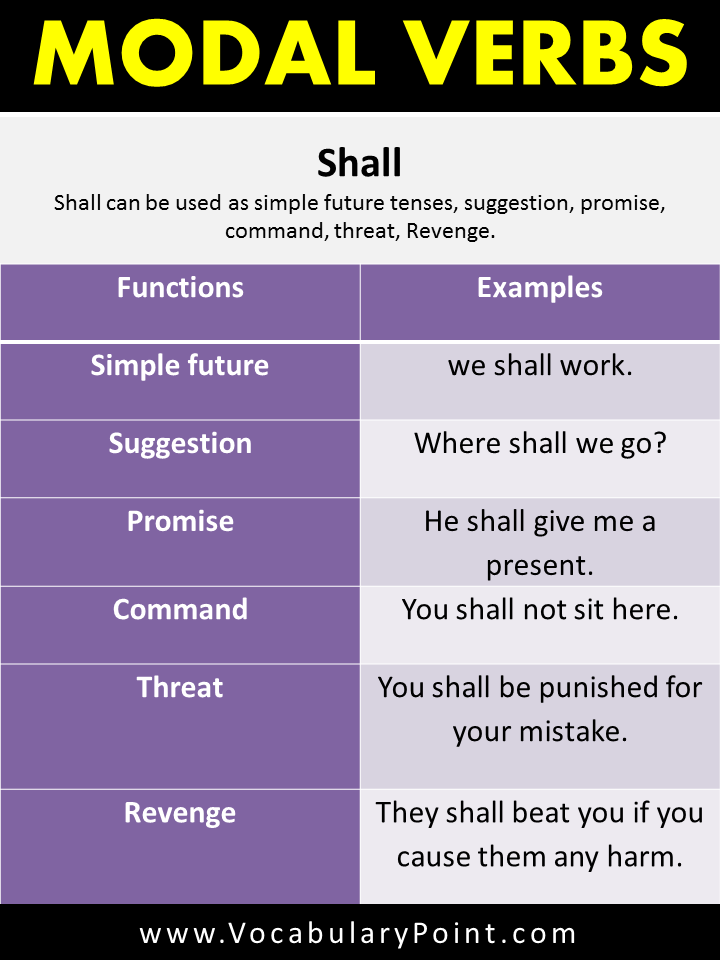
-
Ought to
Ought ( To ) is a modal verb. It has many functions such as moral obligation, suggestion, and desirability.
| Functions | Examples |
| Moral obligation | we ought to obey our elders.
She ought to love her mother. |
| Suggestion | You ought not to kill animals. |
| Desirability | We ought to help the needy. |
-
Will
Will is a modal verb. it perform six functions that are used in daily life speaking like simple future, consent, habit, request, promise, determination.
| Functions | Examples |
| Simple future | He will come soon.
Tomorrow will be Monday. |
| Consent | He will take these books.
They will prefer to go there. |
| Habit | He will talk about nothing but films |
| Request | Will you please lend me your books? |
| Promise | I shall show you better performance. |
| Determination | We will get distinction in test. |
-
Would
Would is a modal verb. It is used in desire, polite request, past of will, Equivalent to will, habit, conditional, past obligation.
| Functions | Examples |
| Desire | I wish, you would reach in time.
Would that I was a king! |
| Polite request | would you please lend me your camera?
Would you please lend me your books? |
| Past of will | He asked me if I would accompany him to Multan. |
| Equivalent to will | I hope that he would come here.
I would like you to accompany me. |
| Habit | My mother would wash clothes daily. |
| Conditional | If I had to leave, I would probably go to America. |
| Past Obligation | I would often go out for a walk.
You would have gone to Karachi. |
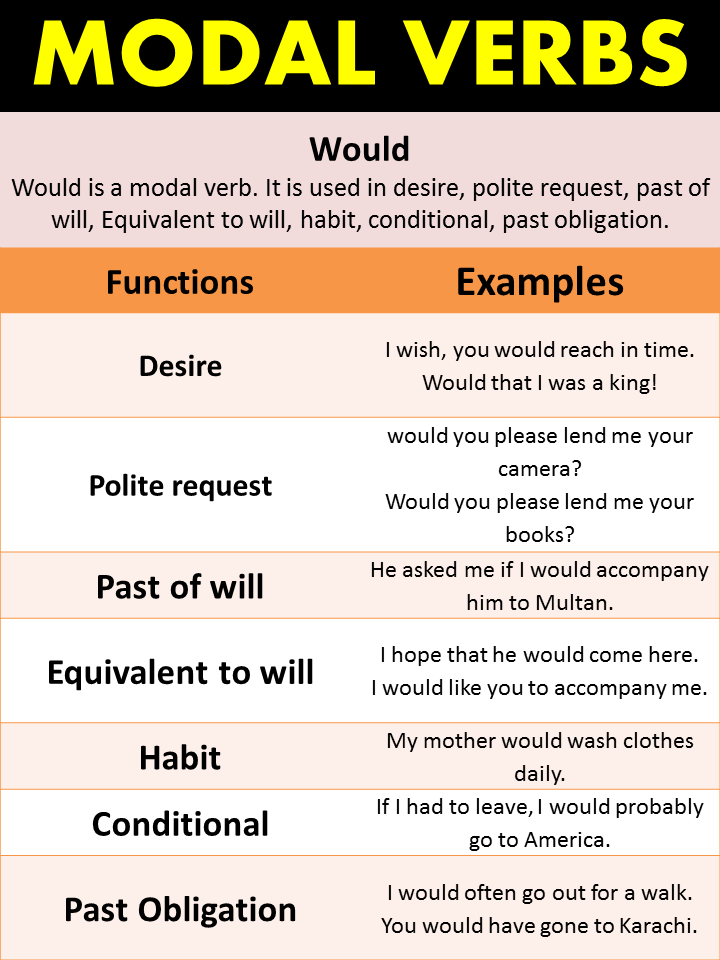
-
Should
Should is a modal verb. It has six functions like will modal verbs, first is used in suggestion, obligation duty, polite needs, past obligation, Probability, surprise.
| Functions | Examples |
| Suggestion | We should abide by the law. |
| Obligation Duty | We should obey our parents and teachers.
We should love the young. |
| Polite Needs | I should like you to obey your parents.
I should like him to work hard. |
| Past Obligation | You should have helped me in trouble. |
| Probability | You should be in England now. |
| Surprise | He should be in Karachi now!
I am wondered that you should have acted so stupidly. |
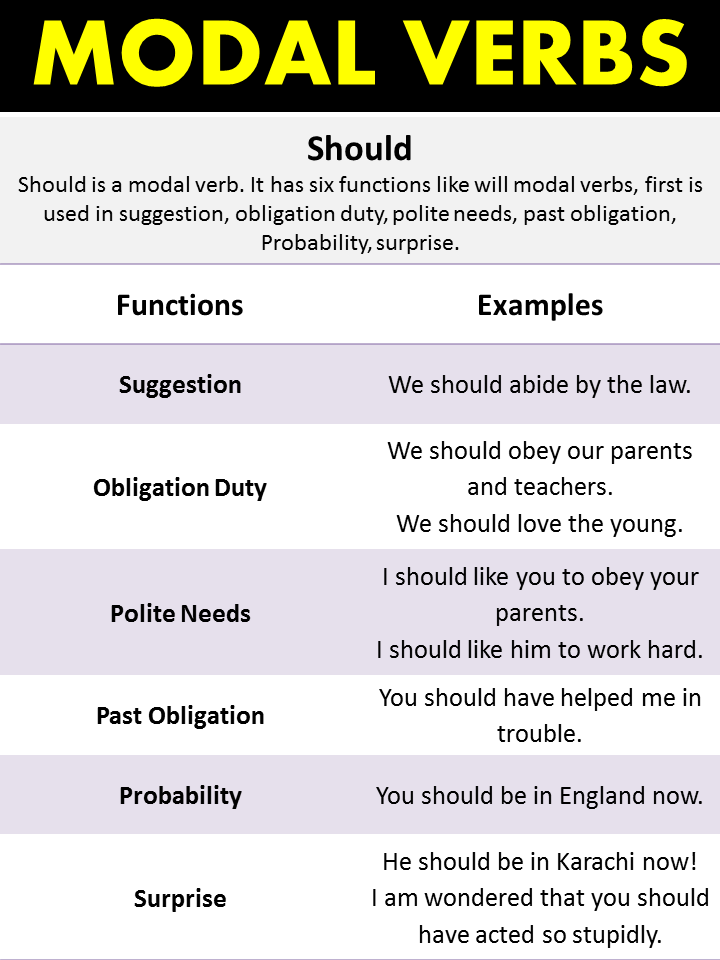
-
Used To
Past habit can be complete with used to modal verbs. Used to is a modal verb. For examples: She used to attend the meeting daily.
| Functions | Examples |
| Past habit | I used to play hockey in my youth.
We used to go to school daily. |
-
Need
Need is a modal verb. It has two functions obligation, necessity.
| Functions | Examples |
| Obligation | You need not come here. |
| Necessity | I need hardly take you watch.
You need not take the exam if you don’t want to. |
-
Dare
Dare is a modal verb it is used in courage and bravery.
| Functions | Examples |
| Courage/ Bravery | we dare not call you.
Dare you write us and complain? He dare not enter my house. How dare you go there? He dare not speak in my presence. |
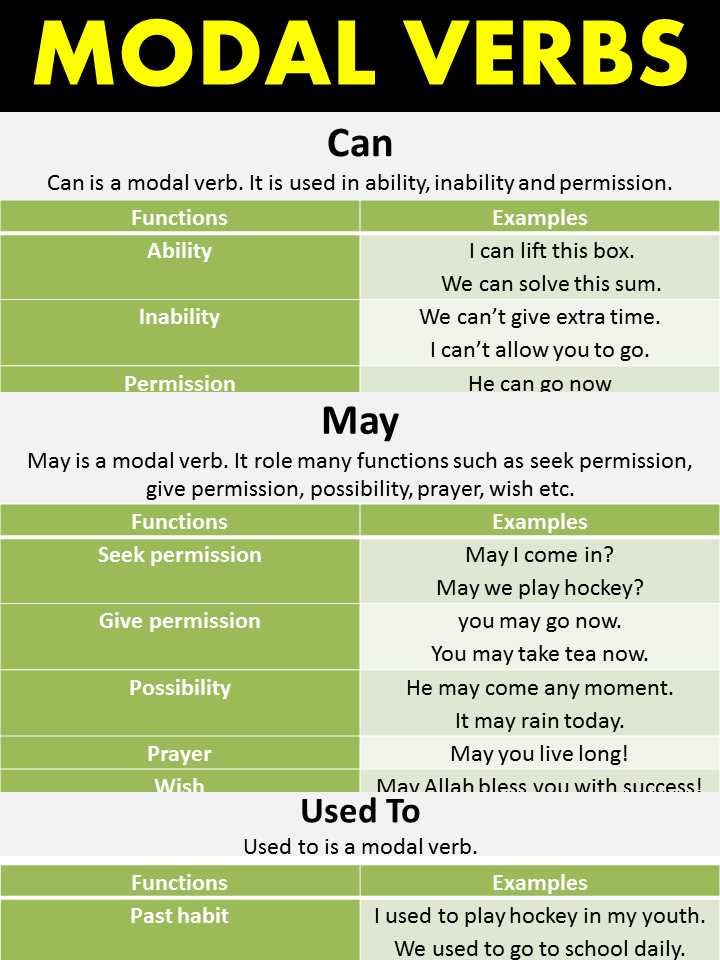
-
Can
Can is a modal verb. It is used in ability, inability and permission.
| Functions | Examples |
| Ability | I can lift this box.
We can solve this sum. |
| Inability | We can’t give extra time.
I can’t allow you to go. |
| Permission | He can go now |
-
May
May is a modal verb. It role many functions such as seek permission, give permission, possibility, prayer, wish etc.
| Functions | Examples |
| Seek permission | May I come in?
May we play hockey? |
| Give permission | you may go now.
You may take tea now. |
| Possibility | He may come any moment.
It may rain today. |
| Prayer | May you live long! |
| Wish | May Allah bless you with success! |
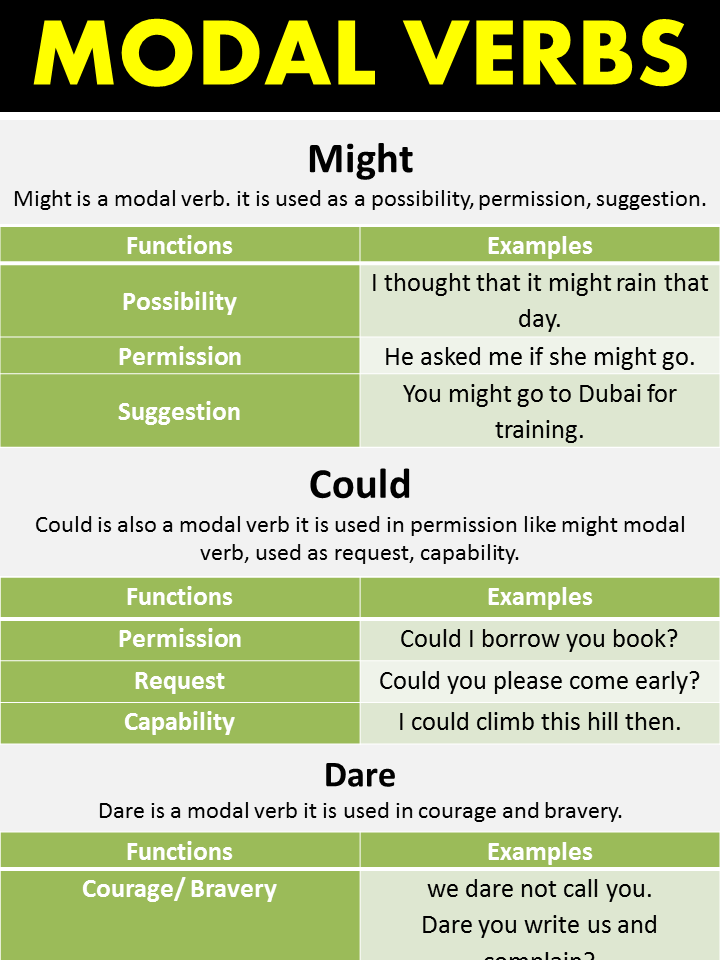
Might
Might is a modal verb. it is used as a possibility, permission, suggestion.
| Functions | Examples |
| Possibility | I thought that it might rain that day. |
| Permission | He asked me if she might go. |
| Suggestion | You might go to Dubai for training. |
- Could
Could is also a modal verb it is used in permission like might modal verb, used as request, capability.
| Functions | Examples |
| Permission | Could I borrow you book? |
| Request | Could you please come early? |
| Capability | I could climb this hill then. |
-
Must
Must is a modal verb. It performs many functions like necessity, prohibition, obligation, determination.
| Functions | Examples |
| Necessity | We must leave for Multan now. |
| Prohibition | Visitors must not litter the park. |
| Obligation | We must go there. |
| Determination | I must get this book. |
Exercises About Modal Verbs
- ——- You like to come with me for a walk?
- He——- reach tomorrow?
- They ——- save some money for rainy days.
- The manager said that I ——- leave the office whenever I wanted.
- ——- You help me now.
- ——- I use your mobile phone?
- He prayed that it ——- rain that day.
- It V rain tomorrow.
- There is no ——- for us to come to office tomorrow.
- ——- Allah makes you prosperous!
- She ——-work seriously or she will lose her job.
- We ——- type all the latter’s today only there will do.
- You ——- not worry about my health.
- You ——- be punctual in your duty.
- ——- That he had come soon!
- ——- You please pass over the salt.
- ——- I go out for a picnic?
- She ——- not enter my office.
- When he was young he ——- play a lot of cricket.
- We ——- avenge the wrongs done to us.
- We ——- get up early to maintain our health.
- They ——- watch many movies in their youth.
- It ——- rain today.
- They ——- be at home by now.
- You ——- respect the laws of the country.
- He said that he ——- not accompany me.
- She said that he ——- carry my bag.
- They ——- sit for hours listening to music.
- Children ——- obey their parents and teachers.
- He ——- go to school daily when he was a child.
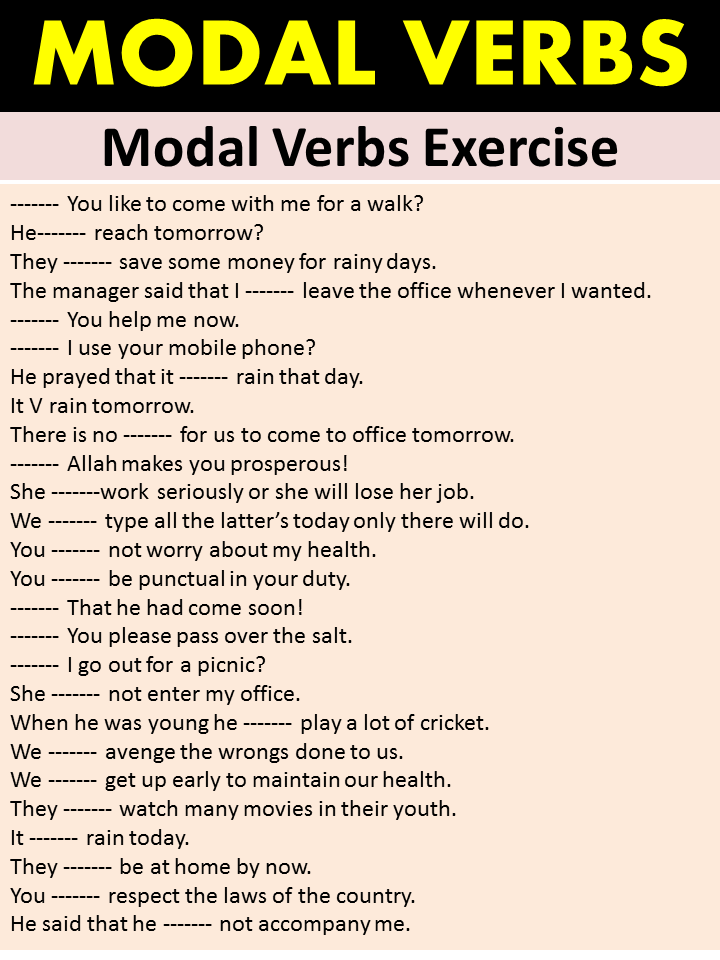
You Can Download All Modal Verbs PDF

